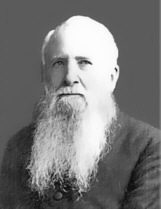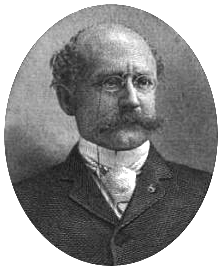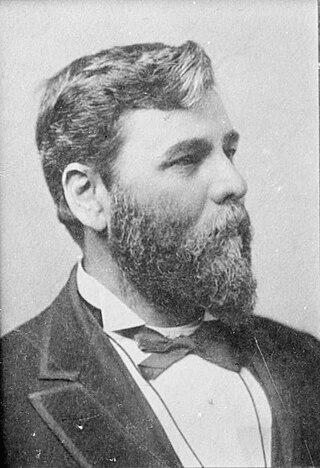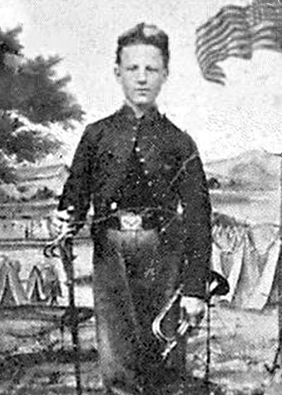
Wager Swayne was a Union Army colonel during the American Civil War and was appointed as the last major general of volunteers of the Union Army. Swayne received America's highest military decoration the Medal of Honor for his actions at the Second Battle of Corinth. He also was effectively the military governor of Alabama from March 2, 1867, to July 14, 1868, after the passage of the first Reconstruction Act by the U.S. Congress until Alabama was readmitted to the Union. Robert M. Patton remained the nominal governor during this period but as the local army commander, Swayne controlled the State government. During the Reconstruction era, Swayne oversaw the Freedmen's Bureau in Alabama and helped establish schools for African Americans in the state. He was the first person born after Alabama statehood, to govern the state.

John Moulder Wilson was a Union Army officer and later served as Chief of Engineers as well as serving as Superintendent of the United States Military Academy from 1889 to 1893. He was a recipient of the Medal of Honor for bravery in combat during the American Civil War.

Milton Lorenzo Haney was a regimental chaplain in the United States Army.

Henry Harrison Bingham was an American politician from Pennsylvania who served as a Republican member of the U.S. House of Representatives for Pennsylvania's 1st congressional district from 1879 to 1912. He was a Union Army officer in the American Civil War, fought in some of the key battles of the war and received the United States Military's highest award for valor, the Medal of Honor, for his actions at the Battle of the Wilderness.

William J. Archinal was an American Civil War Union Army soldier who received the Medal of Honor for his actions at the Battle of Vicksburg.
William Steinmetz was a Union Army soldier during the American Civil War who received America's highest military decoration the Medal of Honor for his actions at the Battle of Vicksburg, Mississippi.

William Edward Birkhimer was a United States Army brigadier general and lawyer received the Medal of Honor while a captain during the Philippine–American War. His career was long and varied, as he started as an Iowa private in the Union Army during the Civil War. He is buried in Arlington National Cemetery.

Milton Murray Holland was a Union Army soldier during the American Civil War and a recipient of America's highest military decoration—the Medal of Honor—for his actions at the Battle of Chaffin's Farm.

Powhatan Beaty was an African American soldier and actor. During the American Civil War, he served in the Union Army's 5th United States Colored Infantry Regiment throughout the Richmond–Petersburg Campaign. He received America's highest military decoration, the Medal of Honor, for taking command of his company at the Battle of Chaffin's Farm, after all officers had been killed or wounded.

James H. Bronson was an African American Union Army soldier during the American Civil War and a recipient of America's highest military decoration, the Medal of Honor.

Absalom Baird was a career United States Army officer who distinguished himself as a Union Army general in the American Civil War. Baird received the Medal of Honor for his military actions.

Richard Enderlin was a musician and United States Army soldier who received a Medal of Honor for the heroism he displayed when fighting in the Battle of Gettysburg in 1863.

Louis Renninger was a Union soldier who received the Medal of Honor for gallantry in the American Civil War.

John Wilson Sprague was an American soldier and railroad executive. He served as a general in the Union Army in the Western Theater of operations during the American Civil War. He received the Medal of Honor for gallantry at the Battle of Decatur during the Atlanta Campaign. After the war, he was a railroad executive and later co-founded the city of Tacoma, Washington, serving as its first mayor.

John Cook was a bugler in the Union Army during the American Civil War. At age 15, he earned the United States military's highest decoration, the Medal of Honor, for his actions at the Battle of Antietam.

For the federal official appointed see Charles William Anderson

Joseph Franklin Carter was an American soldier who fought in the American Civil War. Carter received the country's highest award for bravery during combat, the Medal of Honor, for his action during the Battle of Fort Stedman in Virginia on March 25, 1865. He was awarded the Medal of Honor on July 9, 1891.
John H. Brown was a United States soldier who fought with the 47th Ohio Infantry during the American Civil War. He received the country's highest award for bravery during combat, the Medal of Honor, for his action during the Battle of Vicksburg in Mississippi on May 19, 1863. He was honored with the award on August 24, 1896.

Captain William Wallace Cranston was an American soldier who fought in the American Civil War. Cranston received the country's highest award for bravery during combat, the Medal of Honor, for his action during the Battle of Chancellorsville in Virginia on 2 May 1863. He was honored with the award on 15 December 1892.
Sergeant Hiram H. De Lavie was an American soldier who fought in the American Civil War. De Lavie received the country's highest award for bravery during combat, the Medal of Honor, for his action during the Battle of Five Forks in Virginia on 1 April 1865. He was honored with the award on 10 May 1865.















